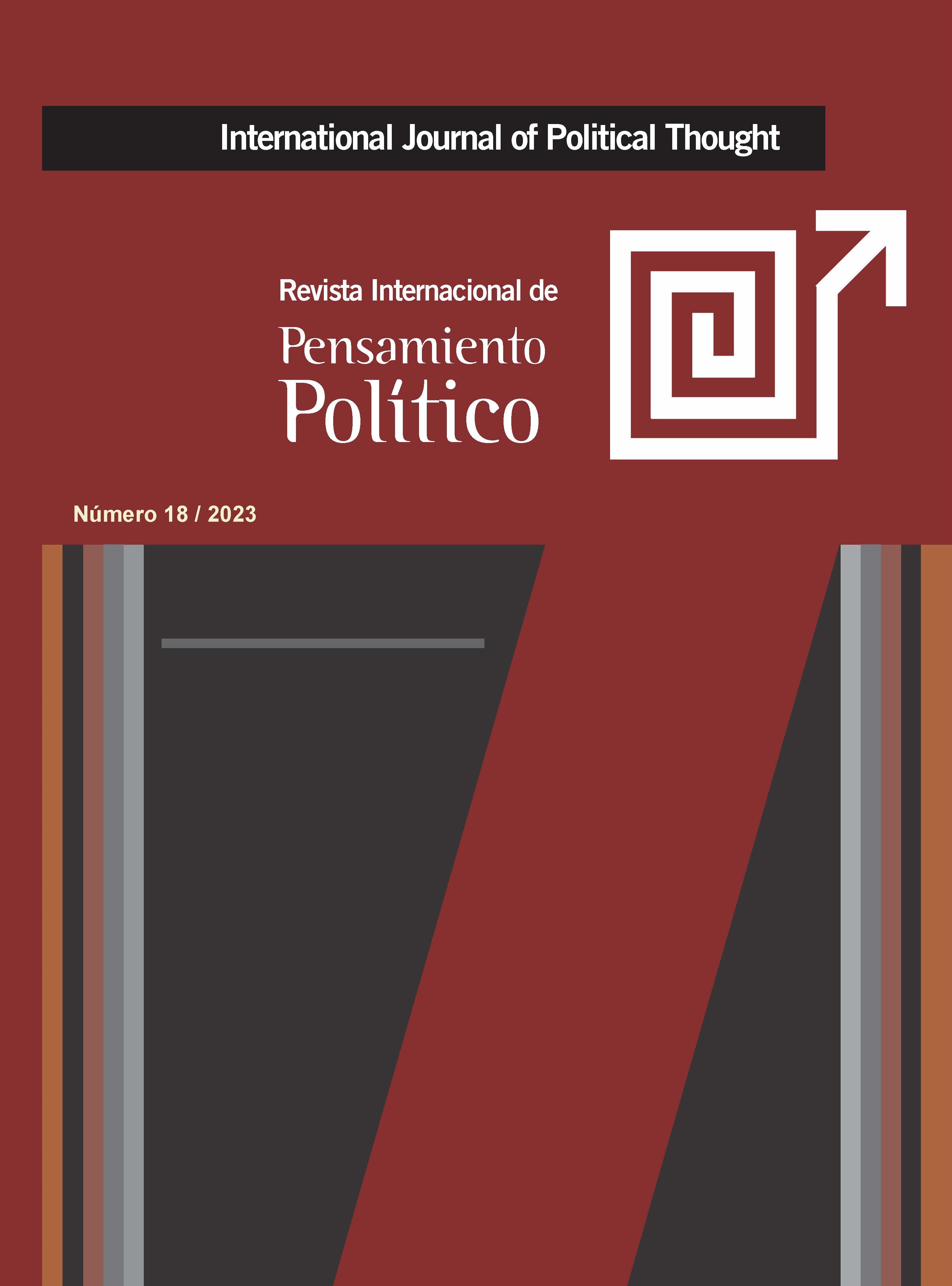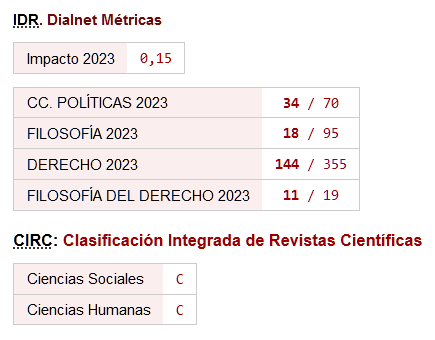El derecho a la ilusión
Hacia una teoría de la emergencia
DOI:
https://doi.org/10.46661/revintpensampolit.8460Palabras clave:
Derechos Humanos, ilusión, religiones, irracionalidadResumen
Aunque la Declaración Universal de Derechos Humanos (1948) y otras muchas constituciones, tratados internacionales y declaraciones proclaman y protegen el derecho a la libertad de religión, ningún documento, en la actualidad, parece proclamar o proteger la libertad más amplia a la que pertenece la libertad de religión: el derecho a delirar. No se trata, en modo alguno, de denigrar ninguna religión o creencia religiosa en particular. Se trata más bien de reconocer que una multitud de creencias religiosas persistentes representan una aceptación colectiva, por parte de la especie humana, de prácticas culturales irracionales como parte de nuestro proceso de creación de significados y un aspecto fundamental de nuestra evolución. ¿Por qué, entonces, las prácticas culturales irracionales no se extienden al individuo? ¿Por qué las prácticas irracionales individuales son, en la gran mayoría de los casos, condenadas como formas de enfermedad mental, depresión o locura? ¿Por qué condenamos las prácticas irracionales del individuo, pero honramos y protegemos las prácticas irracionales de los grupos?
Descargas
Citas
Bayne, T., & Pacherie, E. (2005). In defence of the doxastic conception of delusions. Mind & Language, 20(2), 163-188. https://doi.org/10.1111/j.0268-1064.2005.00281.x DOI: https://doi.org/10.1111/j.0268-1064.2005.00281.x
Bentall, R. P. (2018). Delusions and other beliefs. Delusions in context, 67-95. https://doi.org/10.1007/978-3-319-97202-2_3 DOI: https://doi.org/10.1007/978-3-319-97202-2_3
Currie, G., & Jureidini, J. (2003). Art and delusion. The Monist, 86(4), 556-578. https://doi.org/10.5840/monist200386429 DOI: https://doi.org/10.5840/monist200386429
de Guevara, B. B. (2016). Myth in international politics: Ideological delusion and necessary fiction. Myth and Narrative in International Politics: Interpretive Approaches to the Study of IR, 15-46. https://doi.org/10.1057/978-1-137-53752-2_2 DOI: https://doi.org/10.1057/978-1-137-53752-2_2
Hopper, S., & McSherry, B. (2001). The Insanity Defence and international human rights obligations. Psychiatry, Psychology and Law, 8(2), 161-173. https://doi.org/10.1080/13218710109525016 DOI: https://doi.org/10.1080/13218710109525016
Kaliski, S. (2012). Does the insanity defence lead to an abuse of human rights?. African journal of psychiatry, 15(2), 83-87. https://doi.org/10.4314/ajpsy.v15i2.11 DOI: https://doi.org/10.4314/ajpsy.v15i2.11
Lothane, Z. (1997). Omnipotence, or the delusional aspect of ideology, in relation to love, power, and group dynamics. American Journal of Psychoanalysis, 57(1), 25. https://doi.org/10.1023/A:1024622504975 DOI: https://doi.org/10.1023/A:1024622504975
Marsh, G. E. (2009). The demystification of emergent behavior. arXiv preprint arXiv:0907.1117.
Mutua, M. W. (1995). The ideology of human rights. Va. J. Int'l L., 36, 589.
Quinlan, P. (2010). The Human Rights Delusion: A Defence of the Narrative Tradition of the Common Law. U. Notre Dame Austl. L. Rev., 12, 69.
Rivera, J. L. D. (1993). Creativity and psychosis in scientific research. American Journal of Psychoanalysis, 53(1), 77-84. https://doi.org/10.1007/BF01250075 DOI: https://doi.org/10.1007/BF01250075
Steers, J. (2009). Creativity: Delusions, realities, opportunities and challenges. International Journal of Art & Design Education, 28(2), 126-138. https://doi.org/10.1111/j.1476-8070.2009.01600.x DOI: https://doi.org/10.1111/j.1476-8070.2009.01600.x
Stenlund, M. (2013). Is there a right to hold a delusion? Delusions as a challenge for human rights discussion. Ethical theory and moral practice, 16, 829-843. https://doi.org/10.1007/s10677-012-9390-3 DOI: https://doi.org/10.1007/s10677-012-9390-3
Stenlund, M. (2014). Freedom of delusion: Interdisciplinary views concerning freedom of belief and opinion meet the individual with psychosis. (Doctoral Thesis)
Zizek, S. (2006). Against an ideology of human rights. Displacement, asylum, migration, 56-85. DOI: https://doi.org/10.1093/oso/9780192807243.003.0003
Descargas
Publicado
Cómo citar
Número
Sección
Licencia
Derechos de autor 2023 Mark Darius Juszczak

Esta obra está bajo una licencia internacional Creative Commons Atribución-NoComercial-CompartirIgual 4.0.
Política de acceso abierto
Se permite el acceso libre y abierto de cualquier interesado a todos los contenidos de los números de la revista, sin costo alguno, pudiendo imprimir y trasladar todos los artículos, con la única condición de precisar la fuente y la autoría.
La revista: a) no cobra a las autorías costes por el procesamiento de los artículos ni por el envío de los mismos, b) mantiene el copyright para los autores sin restricciones, c) facilita a los autores conservar sus derechos de publicación sin limitaciones.
La Revista Internacional de Pensamiento Político es una obra original del Laboratorio de Ideas y Prácticas Políticas de la Universidad Pablo de Olavide. Todos los artículos incluidos en la Revista son obra original de sus respectivas autorías. Esta Revista se ofrece libremente a la comunidad científica y académica sin coste alguno y libera los contenidos de acuerdo a la licencia "Reconocimiento-NoComercial-CompartirIgual 4.0 CC BY-NC-SA" del proyecto Creative Commons dispuesta en la siguiente url: https://creativecommons.org/licenses/by-nc-sa/4.0/legalcode
Si deseas traducir o compilar alguno de los artículos aquí disponibles, por favor, ponte en contacto













